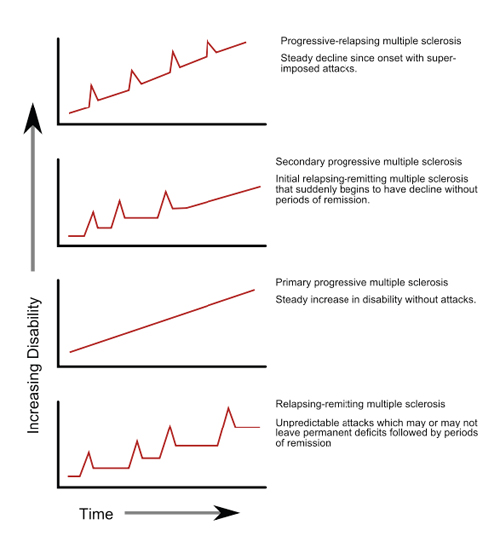@ehBeth,
ehBeth wrote:
They are telling you that some forms of MS present as an illness with episodes of recovery and remission.
During early stages of those forms some of the episodes of the recovery may be to complete recovery. As the illness continues, remission and recovery and remission continues. Recovery in later stages is less likely to be complete.
these forms of MS could be examples of the saying "one step forward, two steps back".
 http://www.patient.co.uk/education/multiple-sclerosis
http://www.patient.co.uk/education/multiple-sclerosis
Excellent!
Your presentaton alone stands with logical perfection.
It helps, no doubt about that.
It reflects the complexity, atrocious grammar and even the imperfection of the orginal text (that context).
Let us take a review on the original text:
MS is a chronic inflammatory demyelinating disease of the CNS of unknown cause. The course is extremely variable, but
most patients initially experience relapses with
complete or near-complete recovery interspersed with periods of clinical remission. Although a minority of patients have only minimal symptoms,
most become disabled in time as a result of
incomplete recovery from relapses or conversion to a progressive phase of the disease.
"Most (patients) become disabled (sometimes in future) due to "
incomplete recovery from relapses." Well, those who have got complete or near-complete recovery will not become disabled. Since
most patients initially experience relapses with
complete or near-complete recovery , in other words, the "most patients will not become disabled." So saying "
most become disabled in time as a result of
incomplete recovery from relapses or conversion to a progressive phase of the disease" is not acceptable; it is logically flawed.
Because when "most patients have had a complete recovery", they cannot at the same time "have had incomplete recovery."
The illusion that readers will easily be buried within is: People with complete recovery at the initial stage will at later time relapse as well.
No, that is not true. The authors themselves have denied it: patients become disabled due to incomplete recovery, not from complete recovery.
Oh, what a mess.